Your Guide to Sizing Gas Struts
Gas struts can be used for a variety of applications: cars, furniture, fitness equipment, and more! As DIY van builders, the most common application we use gas struts for is camper van cabinets. This guide is dedicated to helping you size gas struts correctly for whatever application you have in mind!
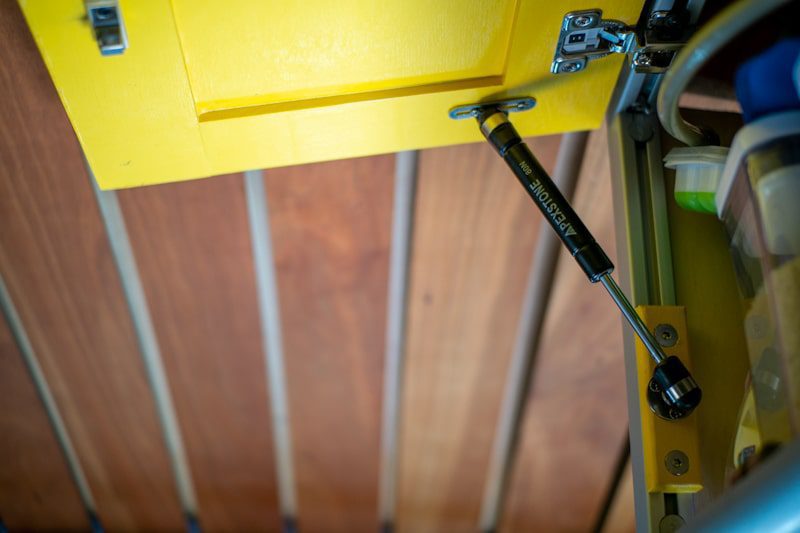
** Disclaimer: This blog post contains various affiliate links that provide a small kickback to us, at no additional cost to you. We truly appreciate your support if you choose to purchase through these! **
What is a Gas Strut?
A gas strut is a sealed compartment of very highly compressed air that expand and contract to lift, and close, cabinet doors. Gas struts are rated by how many Newtons of force is required to compress them. If you have a cabinet held open by a 60 Newton gas strut, the cabinet door will not close until at least 60 Newtons of force is applied.
This is why it is important to buy the proper gas strut for your specific camper van cabinets. You don’t want your cabinet door to exude such force that the gas strut is not strong enough to open the door.
Why use Gas Struts in your Camper Van Conversion?
Gas struts not only make accessing what is in your van cabinets easier, but they also minimize the movement of your cabinet doors when driving. For both of these reasons, we highly recommending adding these to your cabinets as they are also not a massive cost or time commitment.
In addition to upper cabinets, you could also use gas struts to move portions of your bed.
Gas Strut Calculation Basics
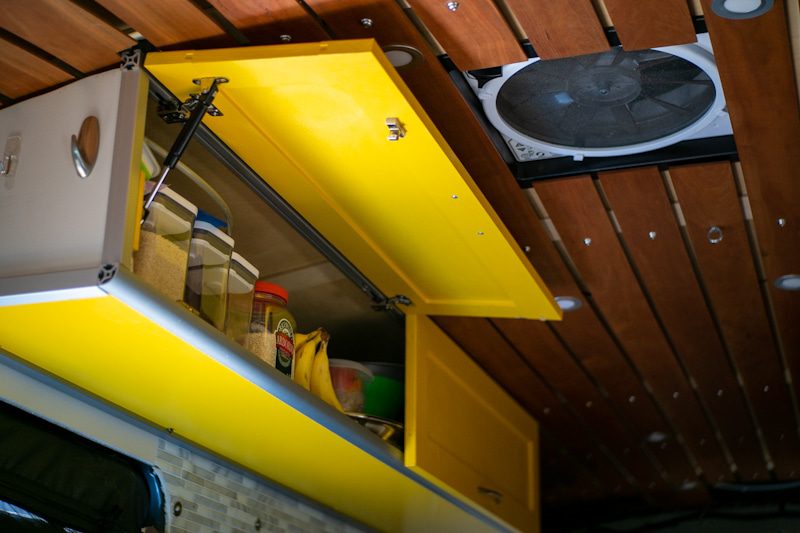
To determine the best gas struts for your application, whether camper van cabinets, or not (!), you only need two things:
Gas Strut Length
Ball and socket gas struts are the most common for cabinets in a van or RV. These gas struts are measured in length when fully extended from the ball center to the socket center.

Gas Strut Strength
Gas struts are measured in force with the unit of Newton. One Newton approximately equals 4.5 pounds of force. The minimum needed force for your gas strut is approximately 13 Newtons for every 1 pound of door weight. Always round up in force to select the right gas strut size! We will dive into a proper calculation for this below.
How to Determine Gas Strut Length for your DIY Van Cabinets
To determine the length of gas strut needed you to should begin by measuring your camper van cabinet door face. Or, if you aren’t working with cabinets, you would measure the face of the pivoting object. This is an “up-down” measurement, or the direction in which the gas strut will be mounted. You should measure from the pivot point, this is usually the hinge.
See photo below for an example. Our measurement would be a little over 12 inches. The proper gas strut length is then 60% of your door height. So for our example, we would want around 7 inches.
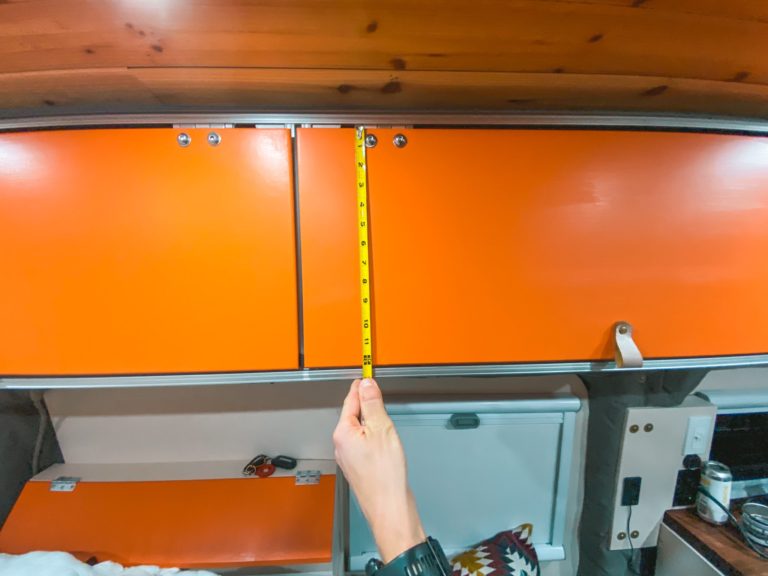
How to Determine Gas Strut Strength for your DIY Van Cabinets
Determining the strength of gas strut needed is a bit more complex, you will need to figure out the mass the gas strut needs to hold. Don’t worry though, by entering your plywood thickness into the gas strut calculator below, all of the nitty gritty dead weight, lift height, and other calculations are done for you.
Please note that we have built the assumption in to the calculator that the material you are working with is consistent density. If it is not, say you cut the middle out and placed netting, then your Newton rating will be a bit higher than you need.
FREE Gas Strut Calculator for Your Cabinets!
Now that you are that much more knowledgable in the gas strut world, you deserve a big BRAVO! Below, we have built a calculator that calculates an ideal gas strut length and Newton rating for your application.
** If you do not see the calculator below, make sure javascript is enabled in your browser. **
Our Gas Strut Recommendations
With the numbers outputted from the gas strut calculator above, you not have a general idea of the best gas strut for you application. However, we want to note that there might not be a perfect gas strut for you. When you cannot find the optimal gas strut, the rule of thumb is to aim for higher newton rating and shorter length. Not the other way around, meaning don’t get a longer strut, or a weaker strut. Longer struts will open you cabinets too high. Weaker struts… well….
As with everything in a van build, it is crucial to purchase gas struts that will withstand the “earthquake a day that your van is going to go through”.
Here are some of our recommendations for gas struts:
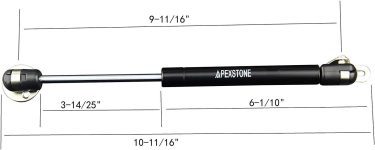



How to Install Gas Struts
Now that you have the correct gas strut for you cabinet door, it’s time for the gas strut installation!
- For your vertical measurement, mount the fixed end of the gas strut the same number of inches down from the hinge pivot point as the strut’s measured length.
- Then for the horizontal measurement on the door, measure the compression distance (also called the stroke distance) and mount it that far out onto the hinge pivot point. This end should have room for fine tuning adjustment in either direction.
TIP: To test your positioning for the first time, close the door SLOWLY to ensure your mounting geometry does not over compress and break the gas strut. If it does, adjust the upper mounting point accordingly.
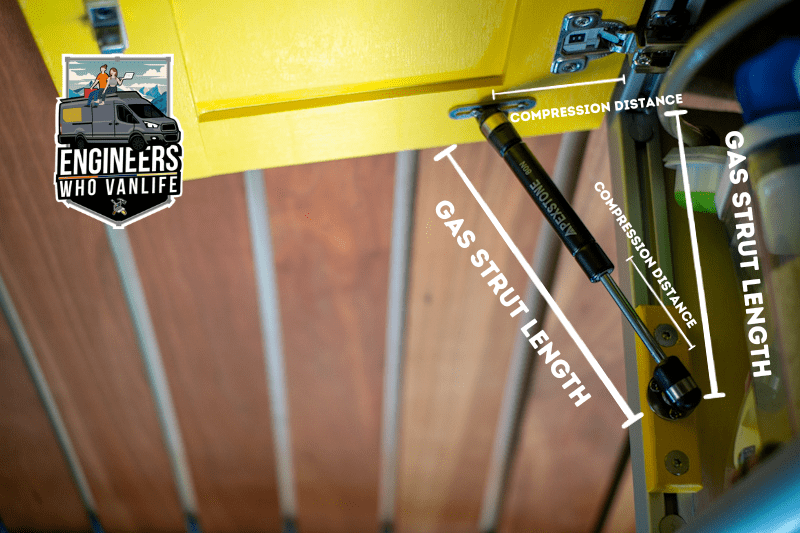
What's next?
Thanks for reading our gas strut sizing guide. We know you might be here for something other than your camper van cabinets and we appreciate you stopping by!
If you are here as a DIY van builder, here are some blogs that might interest you:
Thanks for being here! Happy building!
Eric + Colby
✉️ Join our mailing list for more content!
🙏🏽 If you are looking for more 1:1 van build help, we are here to help via Consulting or Travel Van Building.
[Start Here] Beginner Guides:






Comments 17
Hi my problem is. I have a 7×4 trailer with a flat top on gas struts and I wish to put a 75kg roof top tent on it and be able to lift it appx 600mm to access camping gear. Does this sound feasible, are there struts that would assist me. The other thought is would it tip the trailer upon opening. Your comments would be helpful. Great in theory but not sure.
Cheers Laurie.
Hi there, can you please provide clarification on how to use the calculator? For the “Cabinet Door + Hardware Weight (in lbs)” do I need to remove my door and weigh it or do I enter the thickness of my door per the “How to Determine Gas Strut Strength for your DIY Van Cabinets” section of the article? Thank you.
Author
Either way should work. Weighing your door would be the most accurate, the calculator just assumes a standard uniform density.
Does the calculator assume one or two gas struts per cabinet?
Author
The calculator assumes one! It is total newtons so you could divide by two if you’d like a pair.
The calculator and article are excellent. I had previously purchased the Apexstone Gas strut, which is 7.68 inch 80N, and they are well-made. They work perfectly for my SentrySafe QAP1BE, and now it operates like new. I highly recommend the brand.
Author
That’s great to know, thank you for reading!
Hi there,
Excellent article. Very informative. However, I do not see a calculator. There is simply a line on the page. Was the calculator removed?
Author
No. Is your javascript enabled? It is rendered by a script.
This page ([FREE] Gas Strut Calculator) is by far the simplest explanation of all things gas struts, especially the calculator that I have seen!
Does having 2 gas struts double the weight they can hold? For example, does two 50lb struts enable them to hold up 100lbs?
Author
Great question Trish, 2 gas struts do double the weight they can hold because they are dispersing the weight across them.
How do you find the Gas Strut Force Recommendation that is being outputted? Would love to know for an excel I’m working on.
Thank you for the awesome calculator! Is there a general rule of thumb for where to mount gas struts on the cabinet door? Looks like maybe 2-3 inches from the top edge? Or is it a % of the door height? Thanks!
Author
Each Gas strut should come with an installation recommendation! For us it was 70mm, or almost 3″. As a rule of thumb, the longer the gas strut the further away on the door it will need to be mounted.
Great helpful info, beginning my cabinet build as soon as the material arrives hopefully win the next week or so.
Author
Very nice! Let us know if you have any questions 🙂